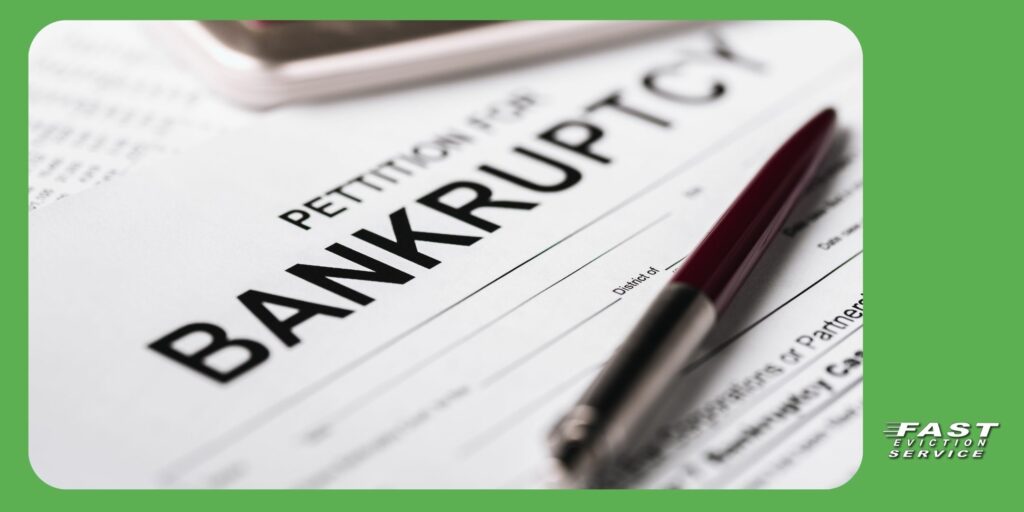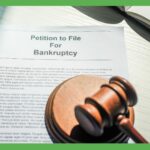You are represented at all times by one of our California Eviction Attorneys | 1-800-686-8686 | intake@fastevict.com | Se habla español
Understanding Tenant Bankruptcy as a Landlord
Updated 11/25/24
When managing rental properties, you may encounter unexpected situations, including tenant bankruptcies. If you’ve ever wondered what happens when a tenant files Chapter 7 bankruptcy or how it might affect your rental agreement, you’re not alone. Tenant bankruptcies can feel daunting, especially if you depend on timely rent payments to maintain your property’s financial health. Knowing how renting during Chapter 7 bankruptcy works and understanding your rights as a landlord can help you navigate this complex process while maintaining a professional and compassionate approach.

Table of Contents
- What is Chapter 7 Bankruptcy?
- What Happens When a Tenant Files Chapter 7?
- Does Bankruptcy Clear Rent Debt?
- Renting During Chapter 7 Bankruptcy
- Can You Evict a Tenant in Chapter 7 Bankruptcy?
- Renting to Tenants with Bankruptcy in Their History
- Frequently Asked Questions
What is Chapter 7 Bankruptcy?
Chapter 7 bankruptcy is a legal process that allows individuals to discharge certain debts when they are unable to pay them. Unlike Chapter 13, which involves creating a repayment plan, Chapter 7 focuses on liquidating non-exempt assets to settle debts. Once a bankruptcy court approves a Chapter 7 filing, creditors—including landlords—are typically subject to an automatic stay. This stay temporarily halts collection efforts, including eviction proceedings and demands for unpaid rent.
For landlords, understanding this process is critical. The automatic stay means you cannot proceed with certain actions, even if your tenant owes back rent. While this can feel frustrating, it’s important to remember that this legal protection is designed to give debtors a fresh start.
What Happens When a Tenant Files Chapter 7?
If your tenant files for Chapter 7 bankruptcy, you will likely receive notice from the bankruptcy court. This notice is your first indication that the tenant has sought legal protection. Once the automatic stay is in place, landlords must tread carefully to avoid violating bankruptcy laws.
While the automatic stay is active, you cannot:
- File an eviction case for unpaid rent.
- Attempt to collect overdue rent through letters, calls, or other communications.
- Remove the tenant or change the locks without legal permission.
However, it’s important to differentiate between rent owed before and after the bankruptcy filing. Any unpaid rent accrued before the filing date becomes part of the bankruptcy estate. Whether this debt is discharged depends on the tenant’s financial situation and the court’s ruling.
Does Bankruptcy Clear Rent Debt?
A common question among landlords is, “Does bankruptcy clear rent debt?” The short answer is: it depends. In Chapter 7 bankruptcy, most unsecured debts, including rent owed before the filing date, may be discharged. This means the tenant is no longer legally obligated to pay those debts.
However, rent that becomes due after the bankruptcy filing is not discharged. If your tenant continues to live in the property post-filing, they are responsible for paying ongoing rent as outlined in your lease agreement. It’s important to communicate clearly and document all payments to ensure you have a clear record of post-filing rent obligations.
Renting During Chapter 7 Bankruptcy
Navigating a rental agreement during a tenant’s Chapter 7 bankruptcy requires a balanced approach. While the automatic stay protects tenants from immediate eviction, it does not prevent landlords from taking action in certain circumstances.
For instance:
- If the tenant fails to pay rent after the filing date, you can file a motion with the bankruptcy court to lift the automatic stay and proceed with eviction.
- If the tenant intends to keep living in the property, they must either reaffirm the lease or reject it. Reaffirmation means they agree to continue abiding by the lease terms, while rejection may lead to vacating the property.
From a landlord’s perspective, renting during Chapter 7 can be a test of patience and legal knowledge. Always consult with an attorney familiar with landlord-tenant law and bankruptcy to ensure compliance.
Can You Evict a Tenant in Chapter 7 Bankruptcy?
Evicting a tenant who has filed Chapter 7 bankruptcy is possible under specific conditions. The automatic stay is not absolute—it can be lifted if the landlord demonstrates good cause. For example:
- If the tenant is not paying rent due after the bankruptcy filing.
- If the tenant poses a significant risk to the property or engages in illegal activities.
To initiate the eviction process, you must file a motion with the bankruptcy court. If granted, you can proceed with eviction following your state’s landlord-tenant laws. Be prepared for delays, as bankruptcy courts prioritize protecting the debtor’s rights while ensuring creditors are treated fairly.
Renting to Tenants with Bankruptcy in Their History
After experiencing a tenant bankruptcy, some landlords may hesitate to rent to tenants with bankruptcy in their credit history. While it’s understandable, denying a qualified tenant solely based on a past bankruptcy may not always be the best decision. Many individuals file bankruptcy to recover from financial hardship, and some emerge more financially stable than before.
When renting to tenants with bankruptcy in their history:
- Conduct thorough background checks to assess their current financial standing.
- Request references from previous landlords to evaluate their reliability as tenants.
- Consider requiring a co-signer or additional security deposit for added assurance.
Being open-minded while implementing protective measures can help you find responsible tenants despite their financial past.
Frequently Asked Questions
1. Does bankruptcy clear rent debt?
Yes, Chapter 7 bankruptcy can discharge unpaid rent owed before the filing date. However, rent due after the filing remains the tenant’s responsibility.
2. What happens when a tenant files Chapter 7?
When a tenant files for Chapter 7, the automatic stay temporarily halts collection efforts, including eviction for unpaid rent. The landlord must follow specific legal procedures to address issues.
3. Is it safe to rent to tenants with bankruptcy on their record?
Yes, renting to tenants with bankruptcy can be safe if you perform due diligence. Assess their current financial situation, check references, and consider additional safeguards like co-signers.
Final Thoughts
Understanding the implications of renting during Chapter 7 bankruptcy helps landlords make informed decisions while respecting the legal rights of tenants. By knowing how to respond when a tenant files Chapter 7, staying compliant with bankruptcy laws, and evaluating potential renters thoughtfully, you can navigate these situations confidently and professionally. Always consult legal experts for guidance tailored to your state’s landlord-tenant and bankruptcy laws.





